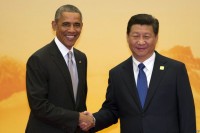US and China agree to deal at the APEC Summit in Beijing, potentially adding billions to global GDP.
International Business Times reported that both China and the US have agreed a deal that will see the elimination of tariffs on a number of technology products, with the article stating that this “could add $190 billion (€152.7 billion) to global GDP”.
US President Barack Obama and China President Xi Jinping shook hands after agreeing to the deal at the APEC Summit held this week at the International Convention Centre in Beijing, with the leaders agreeing after “a succession of longstanding disagreements” regarding the Information Technology Agreement (ITA), a trade deal between 78 nations that “represents 97 percent of the world’s trade in IT products” and was first introduced in 1996.
Efforts to alter and expand the ITA had previously been stopped by “Chinese resistance”, with talks last year seeing China refusing to remove tariffs “on up to 200 kinds of technology products”. However, the new agreement between the US and China will mean that most of these tariffs will be removed, with US negotiators reportedly convincing China that it will “benefit greatly” from the deal. One particularly relevant aspect of the agreement was the announcement that tariffs on printer cartridges up to 25 percent have been reduced to zero.
Once the US and China agreed to the deal, “the rest of the WTO members signed up to the ITA”, which will allow them to “move swiftly” to approve the reduction in trade tariffs; with Obama stating that the development – described as “the first major WTO tariff cutting initiative in 17 years” – would “contribute to a rapid conclusion to the broader negotiations in Geneva”.
US Trade Representative Michael Froman said the development is “encouraging”, estimating that it could “make sales worth $1 trillion (€803.6 billion) tariff-free and create 60,000 jobs in the US”, with the deal expected to possibly be ratified by December.
Executive Vice-President of the US Chamber of Commerce Myron Brilliant added: “With so many new products created since the ITA was concluded two decades ago, expanding the agreement’s coverage is imperative. With trade in tech goods surpassing $4 trillion (€3.2 trillion) annually, the commercial significance of these negotiations is obvious.”
Prior to the agreement, Dieter Ernst, Senior Fellow at Hawaii-based research organisation East West Centre, had commented on the repercussions of continued disagreements regarding the ITA: “The stalemate in ITA-2 negotiations signals a possible roadblock to progressive trade liberalisation in high-tech industries.
“Mega-developing countries like India and China have enough resources to cope with a possible stalemate of ITA-2 negotiations […] but for the majority of developing countries, such stalled and incomplete trade liberalisation could have quite serious consequences, depriving them of speedy access to critical productivity-enhancing information technologies.”

